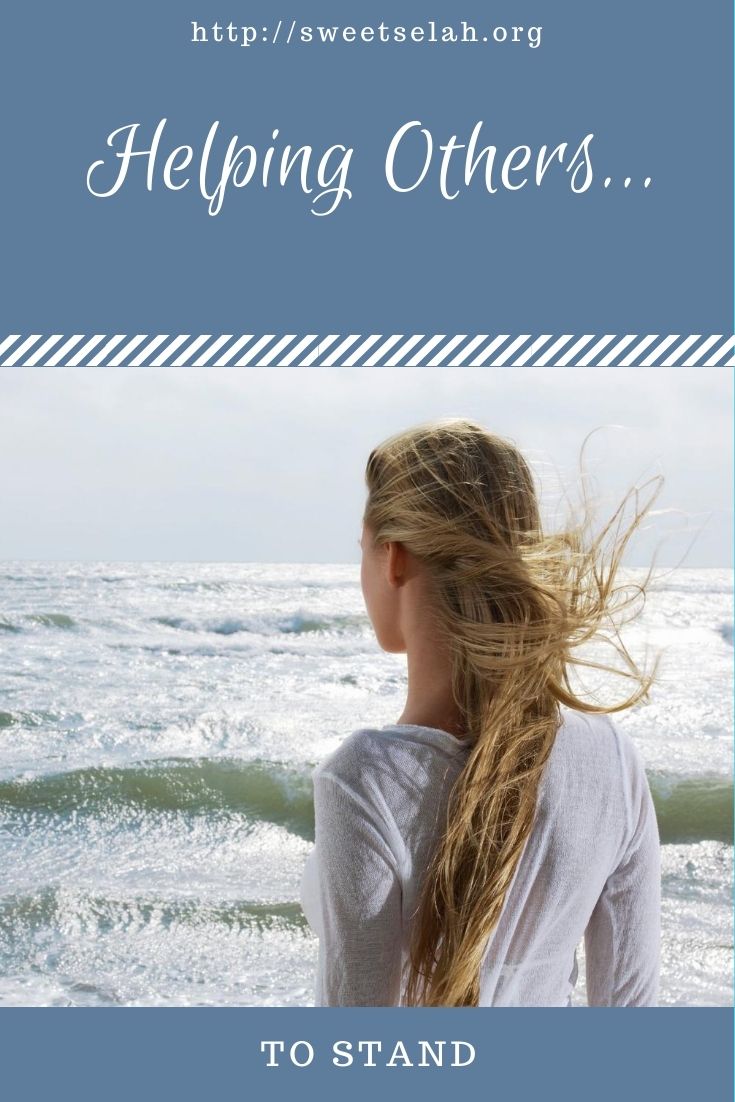
But that does not mean we want to dominate you by telling you how to put your faith into practice. We want to work together with you so you will be full of joy, for it is by your own faith that you stand firm. —2 Corinthians 1:24 NLT
I was a young wife living far from home when I met her. She had multiple problems far beyond anything I had ever seen in my sheltered life. Her poverty, her lack of cleanliness, and her inability to reciprocate made it a challenging friendship right from the start. I tried so hard to help her. I bought her things. I cleaned up after her. I gave and I gave and I gave. And she took. Sometimes with a thank you, but often with none. She always seemed to need more of me. I wore myself out trying to make her life better and to help her feel loved. I often felt drained and inadequate around her. I never felt like I was enough. And, of course, I wasn’t.
When we moved from the area and I said goodbye, she clung to me. I worried about who would take care of her next, even though she did have resources available to her. As we drove away, I spoke to my husband about all my concerns. He was quiet as I talked, and then he asked me a simple question: “Sharon, is she better off and more able to cope with life than she was when you met her?” It was an honest question, and it shook me. Because the answer was an emphatic no. I had not in any way helped her do for herself. I cooked for her. Babysat her kids. Cleaned. But I did not teach. I had not come alongside her nor helped her learn to manage her own life. It was a classic case of enabling before I’d ever heard of such a word. I had shared my faith and tried to show it by my actions, but she had no visible faith of her own when I left her.
The next time a very needy person came into my life, I was more prepared. I recruited assistance from my Bible study group. My friends and I helped this dear down-and-out woman learn how to balance a budget and live on her welfare check without going through it all the first week. We didn’t cook for her or buy her food when she ran out. We helped her live on what she had. When she visited me and told me how unkind all the churches were to her—she had even left our church because she felt we weren’t giving her enough—I was blunt. I told her she needed to give as well as take. It was not an easy conversation, but it was said in love and with a genuine desire to help her see how to stand on her own. I lost track of her for about a year, but when I next met up with her, she had found a church where she was serving and helping, and she was enrolled in a class to be an aide at a nursing home. I was shocked and relieved and so, so glad! Asked the same question about this second woman and my answer would be yes! I physically did less for her, but I came alongside her with others and helped her do for herself and stand back up again. She was more eager to hear the gospel at this point because she was contributing to her church and not just demanding of it. Amazing difference!
Paul understood this type of mentoring very well. In our passage above, he writes, “But that does not mean we want to dominate you by telling you how to put your faith into practice. We want to work together with you so you will be full of joy, for it is by your own faith that you stand firm.” What do we learn from this? First of all, we can’t force others to walk out their faith. When we dominate and try to control people by our own good deeds, managing their lives for them, we actually weaken them. Instead, just as Paul desired to work together with the Corinthian church, we need to come alongside and not work for others, but work together with them as they learn ways to cope and as they learn to put faith into practice.
Do you know what will fill you with joy? Working together for a common goal in Christ. That’s what! Not sitting back and asking someone to do it all for you, feeling victimized and pitiful. Much truth can be found in the fact that it is by your own faith that you stand firm. The best gift we can give another is to lead them to Christ so they know Him themselves. Then they have the Holy Spirit within them, and God enables them to stand. They aren’t being propped up by our secondary faith. God calls each of us to a personal walk with Him. No one can “save” another soul by his own faith. God alone saves. God alone enables a struggling person to see Him and find Him and cling to Him and discover that He is, indeed, enough. We can work together with them, but they stand firm only when they claim faith in Christ themselves.
Let’s always be kind. Let’s always be willing to serve and help. At the same time, let’s always remember that the most important gift we give another is not our service to them, but introducing them to the only One who can save and enable them to stand. That’s what we really want after all, isn’t it? Just like with our children, the end goal is to see these dear ones we have helped and mentored now stand on their own with Christ alone as their primary support. How I thank God for Jesus and His love for all—from the most broken ones among us to the ones who look like they have it all together but don’t!
Lord, show me how to help others find You so they can stand with Your power and Your love as their foundation. They don’t need me to be their prop. They need a Savior, and there is only One. You. Thank You for Your saving grace and Your power to change lives! Show us how to love well each person You bring into our lives. We can’t do it without You. In Jesus’ Name, Amen.

You are loved,
Sharon
Sweet Selah Ministries
Vision
To inspire a movement away from the belief that “busy is better”
and toward the truth of God’s Word that stillness and knowing
Him matter most—and will be reflected in more effective work and service
Mission
To offer biblical resources and retreats that help women pause (Selah)
and love God more deeply as they know Him more intimately (Sweet)
Donate
If you’ve been blessed, keep the blessing going!
Click over to our Donation page … and thanks.
Share it. Pin it.



